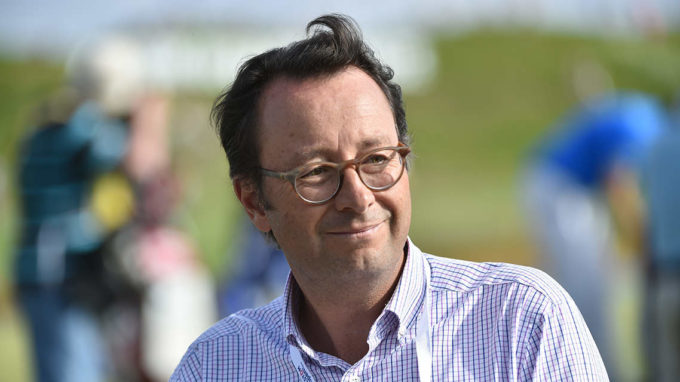Posted on September 1, 2022 in News.
Climate: Pascal Grizot responds to critics of golf
In a press release posted on the website of the French Golf Federation, President Pascal Grizot, discusses the management of this unprecedented climate crisis and responds to the unfair attacks made against golf courses and their practitioners.

@ffgolf
Dear graduates, dear graduates,
At the height of summer, when France was facing an intense period of drought, I sent you a message concerning the watering of our golf courses. This message was intended as a response to the unfair and sometimes violent attacks made against our sport by certain politicians. So that you can form your own opinion, your own convictions on this obviously sensitive subject, I have therefore given you the real figures for the water consumption of our clubs. I have also brought to your attention the strict rules governing the watering of the courses in the event of a major crisis.
While some of our territories suffered terribly from the lack of water, forcing extreme solutions, the golf course managers rose to the occasion. They acted as responsible and supportive actors. It is an undeniable fact. When necessary, everywhere in France, they endeavored to preserve only the greens, that is to say 1 to 2% of the total surface of their golf course. The remaining 98% suffered significantly from the lack of water.
Because it was necessary, some of them even completely stopped watering. 71 of our golf courses were affected. If some of the latter have requested exemptions from the prefects, asserting the framework agreement signed with the Ministries of Ecological Transition and Agriculture allowing the safeguarding of greens, those located in areas of extreme tension naturally abstained. The French media seized on this nascent controversy and called on all of us. Of course, we responded to them individually and transparently with supporting scientific and technical data. The ffgolf has never refused the discussion and has not withdrawn into itself. She didn't because she had no reason to.
If golf still has progress to make and must accelerate its ecological transition, it has nothing to be ashamed of or hide. In two decades, golf courses have already reduced their water consumption by 40%, often resulting in very significant investments. And the industry is on the move. On our website and our social networks, we very regularly highlight the commitments of our golf courses on this aspect and on many others. I am thinking in particular of the preservation and restoration of biodiversity for which golf courses play a recognized role, in particular experts from the National Museum of Natural History and the National Office for Biodiversity with whom we are actively collaborating.
Golf did not hide
Golf is also not hidden because it is good for the planet, as it is for many French people. Our detractors would do well to pay attention.
Do they know that golf courses are ramparts against excessive urbanization, as is particularly the case in various particularly dense demographic areas? No.
Do they know that golf courses help to fight against the artificialization of soils? No.
Do they know that golf courses are fire barriers, as they have proven many times in different places in recent times? No.
Do they know that golf course lawns are carbon capture sinks, just like the forests and plants that border them in most situations? No.
Do they still know that golf areas are cool islands in the event of a heat wave? No.
They don't know any of this.
As they ignore or pretend to ignore that golf is not a sport reserved for the privileged. It has even become, in France, in 2021, the 4th sport in number of licensees behind football, tennis and horse riding. And it is the combination of this double ignorance that leads them to pronounce words that are irresponsible and highly harmful to our sport. It is by ignoring this reality that our critics have rushed to erroneous figures to launch their attacks. The announced water consumption of our sites was 36,5 times higher than the actual national average, deliberately referring to an obsolete parliamentary report, since contradicted by two more recent reports, both serious and professional.
Ignorance hurts. It hurts our managers who employ a total of 15 employees every day and try to make their business prosper like any French company and to ensure its survival when they have to deal with contrary elements. It hurts a sector that did not wait for the summer of 000 to accelerate its ecological transition.
This is why I invite politicians and all those who have targeted us, to restraint and moderation. To analysis, rather than invective. They also face problems that call for answers. Christophe Bechu, Minister for Ecological Transition and Territorial Cohesion in France, recently recalled that one billion m3 of drinking water is lost each year due to leaks in the aging networks of our municipalities.
Despite everything, it is not because we believe these attacks are unjust that the golf course has nothing more to do in terms of water management. Climate change, resource scarcity and the prospect of legitimate regulatory tightening force us to do more. Our managers are fully aware of this. And rest assured that they will be able, under the impetus and with the support of the Federation, to take up this immense challenge.
Solutions, again and again
Solutions exist. Some are within reach. I am thinking in particular of:
- the creation of rainwater reserves: retention basins, watersheds…
- renovation of irrigation systems: eradication of leaks, selective and economical watering system and adoption of new technologies.
- the use of grasses that consume less water and resistant to water stress and disease.
- the use of all effective means to limit evaporation on bodies of water.
These are not the only solutions. There are others but they do not depend only on us. Changes in legislation are necessary in many cases. I am thinking mainly of the use of treated wastewater for watering. What is happening in some of our neighbors should inspire us. The case of Spain concerns me. It rains much less there than in France. However, the impact of drought is less thanks to recycling in particular. In our neighbours, 14% of wastewater is treated against less than 1% in France. Their agriculture and their golf courses do not lack water.
There's no hazard. If I have made ecological transition one of the three pillars of the project that I am leading, with the members of the steering committee, for French golf, it is because this question is decisive for the future of golf. Jérôme Paris, former vice-president of the ffgolf, clearly stated this in the early 2000s when he involved the French Golf Federation in this dynamic. The urgency, we know it. The stakes, we know them. We are already taking action and will continue our efforts.
Be fully assured of our total commitment. With the teams of the Federation, we work tirelessly to put forward our arguments in favor of the development of our sport compatible with ecological issues. Our determination is unwavering. I am also counting on all of you to be behind your clubs and support them in this ecological transition, in which we must all be actors. To this end, we will have to change our outlook and our practices, to preserve our common good, the planet.
Pascal Grizot, president of the ffgolf
To know more : click here
To read our last article on the same subject :
The ffgolf and the Seine-Normandy Water Agency become partners
Louise Uma Landgraf wins brilliantly at the Girls' U16 Amateur Championship
Grace Kim leads the JM Eagle LA Championship
Scottie Scheffler's coronation at the RBC Heritage








